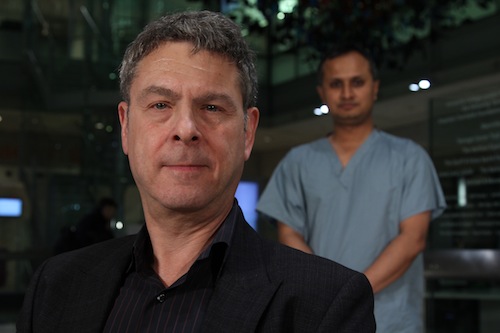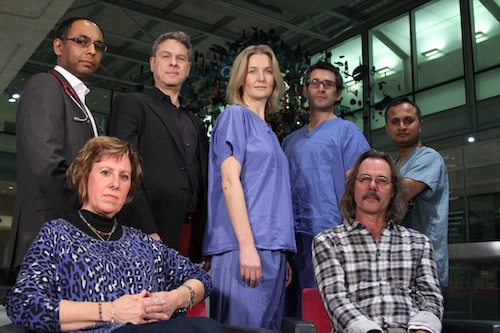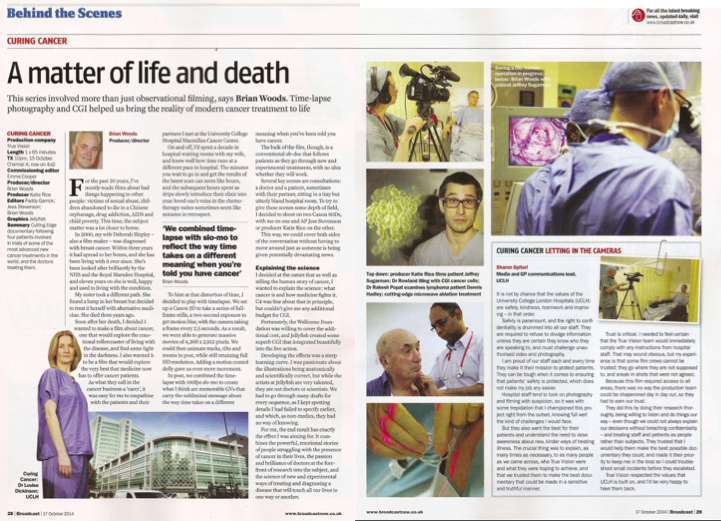True Vision
films that make a difference
Curing Cancer

Every two minutes someone in the UK is diagnosed with cancer. From that life-changing moment the race is on to find a successful treatment before the disease gets too far. With unprecedented access to the new Macmillan Cancer Centre at University College Hospital, Curing Cancer follows four patients taking part in trials of some of the most advanced cancer treatments in the world.
Dennis, Debra, Jeffery and Pete are all facing the future with trepidation, but they have all agreed to take part in ground-breaking trials aimed at improving the way cancer is diagnosed and treated. Made by BAFTA winning director, Brian Woods, this film compassionately follows treatments from lab to ward and tells the story of the anxiety of diagnosis, the joy of success and the desperation of a last chance clinical trial. Philosophical about how cancer changes lives, but also fascinating in terms of what it reveals about new treatments coming through, this film is a sensitive and optimistic insight into the realities of living with cancer.
The film witnesses first-hand how science is being harnessed in the ever more successful fight against cancer. In a snapshot of where the UK is in the fight, the leading doctors in their field give a fascinating insight into how the trial process works and how new treatments come on line.
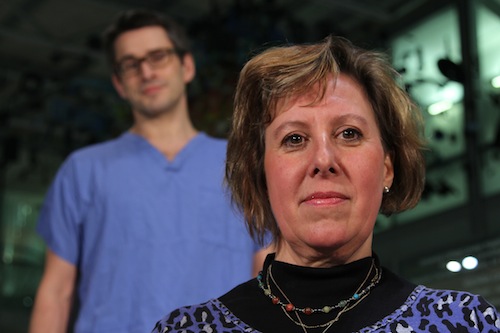
Dennis has been living with lymphoma for eight years. With all conventional treatments exhausted, Dennis and his wife are faced with a stark choice – either palliative “end-of-life” care, or an experimental drug, never before used in the UK, and being tested by scientist Rakesh Popat.
Jeffery fears he has prostate cancer, there’s a family history of the disease. Diagnosis of prostate cancer can be hit and miss, with a chance of false results from traditional biopsies. Jeffery decides to take part in a trial of a new diagnostic process. It should mean that when his consultant, Hashim Ahmed delivers the news, it will be with more certainty.
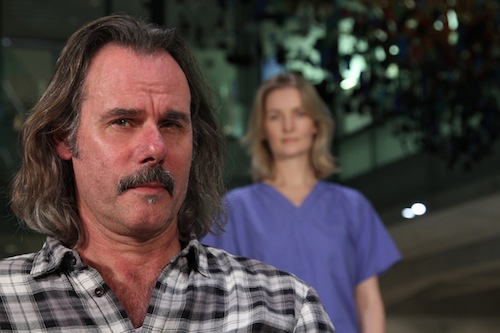
In early trials side-effects seem to be dramatically reduced. The risk, however, is that the treatment is so new that no-one can yet say how successful it will be in preventing the cancer returning.
Using CGI the film is a scientific exploration told through the personal journeys of the individuals taking part in the trials. Sensitively filmed at home and at hospital, the film explores the emotional realities of living with cancer combined with the intense anticipation of potentially finding a cure. Through their relationship with the clinicians, we learn the science, and discover the success or failures of their treatment as they do.
The film was awarded the Grierson Documentary Award for Best Science programme in November 2015. You can watch the award being presented below.
To read about the making of the film - as told in Broadcast magazine, click here.
You can also watch the stories of some other UCH patients below
Darren has bowel cancer which has spread to his liver, he's seeing a specialist team and the Cancer Centre about having a very targeted type of chemotherapy, aimed at delivering drugs just to the tumours in his liver, and sparing the rest of his body.
Katie was first diagnosed with a brain tumour when she was 12, now 20, and studying at Brighton University, she's come to UCH for a special kind of radiotherapy to try to shrink her tumour
What is cancer? Experts from UCLH explain what how cancer arises and what it is.
How do we treat cancer? The UCLH team explain the various different approaches that can be used to treat cancer.
Thinking about going on a trial? Watch the video below to see how ovarian cancer patient, Joanna Price, quizzed her oncologist about the trial he was proposing.
Debra's story - microwave ablation of lung secondaries from sarcoma.
Jeffery's story - a template biopsy to test for prostate cancer.
Dennis's story - taking part in a last chance trial for lymphoma.
Pete's story - treating prostate cancer with high intensity focussed ultrasound.
Awards
Reviews
-
"This was the rarest of televisual feats: an optimistic documentary about cancer."
Tom Rowley - The Telegraph -
"fascinating, hopeful, touching, and even funny at times."
Sam Wollaston - The Guardian -
"Star Trek medicine, involving things like carefully guided heat beams to zap tumours, and drugs that shut down survival pathways of individual cells"
Matt Bayliss - The Express -
"This gentle film, on progress made in developing new cancer treatments, was like sunlight itself"
Andrew Billen - The Times -
"Inspiring documentary highlights pioneering treatments, offering hope to patients"
Tina Campbell - Metro -
"Bafta-winning director Brian Woods delivers a most unusual film: a life- affirming focus on a deadly disease. His emphasis here is on the hope provided by new research into diagnosis and treatment methods"
Gerard O'Donavan - The Telegraph -
"Among all the bright lights of Channel 4's Stand Up To Cancer campaign, this important documentary from Bafta-winning film-maker Brian Woods reminds us what it's all for."
The Mail on Sunday -
"Two days before Channel 4's Stand Up to Cancer telethon, this documentary, by Brian Woods, complements it by showing leading doctors combing research with the treatment of patients."
John Dugdale - The Sunday Times -
"Sensitive, optimistic television with a heart"
Mike Bradley - the Observer -
"The anxiety of biopsies and diagnosis through to the euphoria of success, as well as the sad desperation that comes when the trials do not work - are sensitively and compassionately filmed."
The Guardian -
"A sensitive study of the shocking reality of a cancer diagnosis, Woods's film is also tinged with optimism."
Sophie Heath - The Daily Mail -
"A heartening, almost breezy programme about cancer might seem unlikely, but this one-off is sensitively made and more watchable than a film about the disease has a right to be."
David Butcher - Radio Times -
"Brian Woods's compassionate film - part of Channel 4's Stand Up to Cancer series - will offer hope to the 900 people in the UK who are diagnosed with cancer every day."
David Chater - The Times -
"The film shows Debra Cox undergoing cutting-edge microwave ablation treatment for sarcoma. Dennis Hadley agrees to take an experimental drug as a last chance for treating his lymphoma, and the impact on his tumour astounds even Rakesh Popat, who conducts "
Ian Burrell - The Independent
